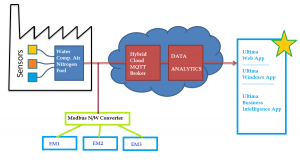In manufacturing plant, there are scenarios and need which is essential to track the meters and sub-meters to efficiently track the consumption of utilities. When we deploy a large number of meters across the plants for different utility consolidation of the meter data at single location through reliable interfaces and then making the right inference is the key for reliable utility accounting.
Scenarios for collecting Meter data through IoT Infrastructure
Modbus Protocol – Modbus protocol could be used along with RS-485 network which has to be connected with the Modbus to Ethernet/Wi-Fi Converter through which data has to be transmitted
Adoption of Smart Meters – Smart meters are having the capability to collect the data and can directly push it to the cloud
OPC – OPC can also be used to communicate with different meters on master/client scenario
WirelessHART – The wireless version operates at 2.4 GHz using 802.15.4, and it provides for a self-organizing, self-healing, time-synchronized network.
Typical example of one such infrastructure
The image on the right-hand side depicts the sensors and meters which are connecting to the IT infrastructure IoT and Metering Infrastructure through
the Cloud-based broker which works on the Publish/Subscribe model. The sensors and Energy meters would be connecting to the Cloud broker infrastructure through TCP means. This is essential in this model for it to work efficiently. The connectivity from the Industrial environment sensors and meter data can be published at different QoS level based on MQTT.
IT Benefits of adopting IoT approach in metering
Data can be centralized to cloud
Data from multiple plants can be aggregated to the cloud database infrastructure
For leveraging the data from instrumentation use the appropriate converters and gateway to connect to the IT infrastructure and converged data
Filtering of data on specific instrumentation instance can be done at the broker level
Data transmission for long-haul networks are managed more efficiently
Business benefits of IoT approach in metering
Can create a homogeneous data collection system for metering resulting in less maintenance
Implementation cost-effective smart meters can be adopted with the solution which gives better reliability
A stream of meter reading can be aggregated for predictive analytics using Time Series data analysis
Implementation of security measures at network gateways would be much more efficient
Consolidation of multi-location data for a holistic view of the plant or organization.
Written By Siva Karthikeyan